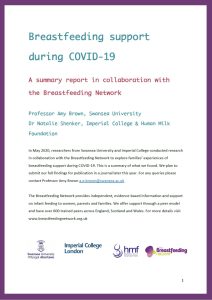In May 2020, researchers from Swansea University and Imperial College conducted research in collaboration with the Breastfeeding Network to explore families’ experiences of breastfeeding support during COVID-19.
Click the image to read the full report:
The following summary has been taken from the report, the full findings will be published in a journal later this year.
COVID-19 and lockdown has been a challenging time for breastfeeding families. Many have stopped sooner than they planned. Although this is unfortunately a common issue even outside of the pandemic3, many blamed a lack of support and lockdown experiences upon their decision to stop.
We know that breastfeeding works best when women receive high quality practical and emotional support from professionals and peers including in the community1. This support had to change once lockdown was in place, with breastfeeding charity organisations making rapid alterations to the way they delivered their service.
Some women were fortunate to be able to access this, evidenced by the multiple, varied queries they had answered during this time, covering both practical and emotional support needs. The majority of those who accessed this support found it useful and wanted it to stay, albeit alongside the benefits of face to face support once possible. For these women, their experience was positive, giving them easy and rapid access to support from the comfort of their homes. Notably, some women accessed this support over and above health professional support during the pandemic. It is clear that breastfeeding organisations provided a valued and needed service at this time – a finding reflected in similar previous research exploring the impact of the Australian Breastfeeding Association during this time4.
Unfortunately, two further groups of women did not have the benefit of this support including those who did not realise it was available, and those who accessed it but either struggled or had a strong preference for face to face provision. These women found a lack of in person care challenging, struggling to convey issues or with technology, or simply wanted the reassurance of someone in the room. It is likely these experiences are not equal; those with more resources and fewer challenges at home will find accessing different sources of support in during difficult times easier.
We found that women who did access charity support when they needed it were more likely to still be breastfeeding at the time of completing the survey compared to those who did not. To some extent their ability and willingness to seek support will in itself have supported these mothers’ ability to continue breastfeeding, most likely reflecting high motivation. However, given what we know about the impact of breastfeeding support for new families1, the range of queries posed to teams, and the positive experiences from some women in this survey, it is evidence that charity breastfeeding organisations have played an important role in ensuring mothers could continue breastfeeding through lockdown.
In terms of where we go from here, the good news is that online breastfeeding support services are working well for many women, helping them to breastfeed for longer. However, many challenges and questions have been set, with some of the answers likely outside the control or remit of organisations offering support. Namely:
- How do we ensure better promotion of availability of online breastfeeding support so that more families know they can access it?
- How do we ensure these organisations are well funded to be able to meet the needs of more women?
- How to we enable all populations to access online support, including those who may not be able to afford technology or high-speed internet connections?
- What is needed to recommence face to face breastfeeding support, given other public spaces such as restaurants and public spaces are open?
Given the known impact of breastfeeding upon population health5 and maternal wellbeing6, the government urgently needs to review its provision of care for new families, considering how it can ensure that more are protected in similar circumstances in the future. Although almost all mothers valued the option to receive online or phone support during lockdown, many expressed a wish for face to face support to continue. Recent press reports have stated that Health Secretary Matt Hancock wishes to encourage future virtual GP appointments unless clinical need, but caution must be urged in relying too heavily on a lack of in person support. It was clear mothers valued both the information they were being given, but also the warmth and connection from face to face support, and engagement with other mothers.
Finally, the impact of breastfeeding charities in supporting mothers practically and emotionally through this stressful period should be celebrated. They have served a community of new mothers, whom without their support may have had a much more challenging breastfeeding experience and likely a premature end to breastfeeding altogether. Their value and contribution must be recognised.
References
1. McFadden, A., Gavine, A., Renfrew, M. J., Wade, A., Buchanan, P., Taylor, J. L., … & MacGillivray, S. (2017). Support for healthy breastfeeding mothers with healthy term babies. Cochrane Database of Systematic Reviews, (2).
2. Unicef UK (2020) Unicef UK Baby Friendly Initiative statement on infant feeding during the coronavirus (COVID-19) outbreak.
3. McAndrew, F., Thompson, J., Fellows, L., Large, A., Speed, M., & Renfrew, M. J. (2012). Infant feeding survey 2010. Leeds: health and social care information Centre, 2(1).
4. Hull, N., Kam, R. L., & Gribble, K. D. (2020). Providing breastfeeding support during the COVID-19 pandemic: Concerns of mothers who contacted the Australian Breastfeeding Association. medRxiv. [preprint] – doi 10.1101/2020.07.18.20152256
5. Victora, C. G., Bahl, R., Barros, A. J., França, G. V., Horton, S., Krasevec, J., … & Group, T. L. B. S. (2016). Breastfeeding in the 21st century: epidemiology, mechanisms, and lifelong effect. The Lancet, 387(10017), 475-490.
6. Brown, A. (2018). What do women lose if they are prevented from meeting their breastfeeding goals? Clinical Lactation, 9(4), 200-207.
7. BBC (2020) ‘More Zoom medicine needed’ in NHS says Hancock https://www.bbc.co.uk/news/health-53592678


